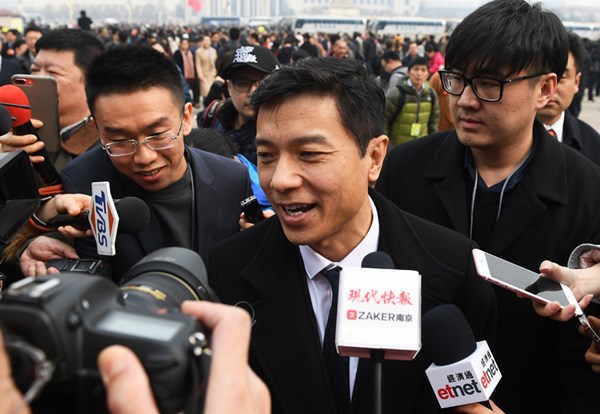Baidu's Li calls for investment fund to boost self-driving sector

Baidu CEO Robin Li (middle) arrives to attend the opening session of the 13th National Committee of the Chinese People's Political Consultative Conference (CPPCC) at the Great Hall of the People in Beijing on Saturday. [Photo/Agencies]
National-level policies boosting industrialization can help promote competitiveness
A national investment fund for developing the self-driving industry should be set up and national-level policies aimed at speeding up the industrialization of self-driving vehicles should be introduced, said Robin Li, chairman and CEO of leading Chinese search engine Baidu Inc.
In his proposal to the first session of the 13th National Committee of the Chinese People's Political Consultative Conference (CPPCC), Li, a member of the committee, said the eligibility criteria for self-driving vehicles' operation should be clarified as soon as possible, and the authorities should issue licenses to suitable enterprises.
Moreover, companies that meet certain requirements should be encouraged to take a lead in carrying out self-driving operational services, he said.
"Self-driving technology is in an early stage of industrialization exploration, and whether the policy matches with technical progress determines the innovation speed and competitiveness of the industry to a certain extent. China urgently needs to ramp up innovation in the policy sector," said Li.
Li also stressed the importance of information safety in self-driving vehicles. "We should strengthen security measures to prevent huge risks caused by hackers and critical data being controlled by others."
In addition, Li also called for preferential funding and tax policies, encouraging enterprises to open their artificial intelligence platforms and technologies, as well as fostering a batch of national AI open platforms with strong competitiveness and great influence.
Consumers who buy intelligent vehicles should be given subsidies, a move to accelerate the promotion of such products.
Baidu, which is pushing AI to fuel growth, with a special emphasis on self-driving vehicles, is confident that such vehicles can hit the roads next year.
The company aims to put autonomous mini-buses that can operate in designated areas into mass production and trial operation by the end of this July, in cooperation with bus manufacturer Xiamen King Long United Automotive Industry Co.
It also plans to launch self-driving cars in 2019 in cooperation with manufacturers JAC Motors and BAIC, as well as Chery Automobile Co.
In December 2017, Beijing released the country's first guideline for road tests of self-driving vehicles, which shows the authorities' support for technological progress through systematic innovation.
In February, China's first closed testing field for self-driving cars officially came into operation in Haidian district of Beijing.
Zeng Zhiling, managing director of LMC Automotive Consulting Co, said Baidu's efforts are significant to the automotive industry, but given safety concerns, more time and tests are needed before such vehicles can reach mass production and large-scale commercial application.
Copyright © The National Committee of the Chinese People's Political Consultative Conference.
All rights reserved. Presented by China Daily.
京ICP备08100501号-1

